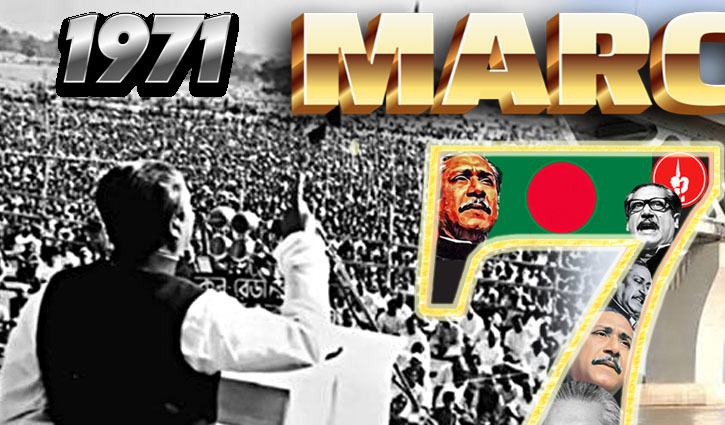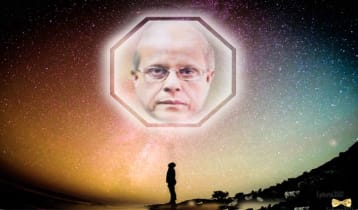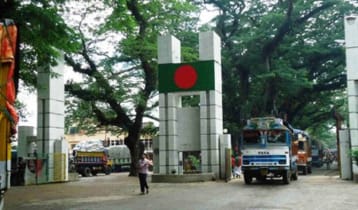March 7, 1971 the day Bangladesh was conceived
Sir Frank Peters || risingbd.com

March 7, 1971 is a date that’s indelibly etched in the hearts and minds of Bengalis worldwide with due pride and justification. And if not, it ought to be.
Momentarily forget Padma Bridge, the Metro, and suchlike. As great as they are, they are pale achievements in comparison (no disrespect intended to Prime Minister Sheikh Hasina). It was on this Allah-blessed, sun-kissed day that work began on the greatest construction EVER known in the history of the region.
There wasn’t a bulldozer, crane, a single yellow-jacketed person wearing a hard-hat, or heavy earth moving equipment in sight. Nor were there any earth shattering, ear-shattering jackhammers that make your ears recoil and beg for mercy.
This was no ordinary everyday foundation stone laying ceremony and those present – all two million of them – no doubt felt that.
The architect, a handsome, well known, very talented, much loved, and greatly admired politician named Sheikh Mujibur Rahman originally from Tungipara, had no previous experience of designing nor building such a colossal structure – there hadn’t been any need. But as if guided by divinity in a dream, he went ahead anyway. Dr. Martin Luther King knew what that was like.
Great injustice
The great concept of 1971 was never part of his career plans and there wasn’t a blue print in existence for reference. If the people with whom he had aligned his unique political talents had behaved honourably and justly, the work would never have even begun and not even a single blade of grass trod upon.
Mujib, as he was affectionately known, went to Ramna Racecourse (now Suhrawardy Udyan) in Dhaka as a political leader to update and inform his admirers cum voters of his thoughts on his political betrayal.
What may have been intended as a regular political rally, quickly developed into becoming something more spectacular, a war cry for emancipation from the oppression of West Pakistan, which shackled liberty.
Countless millions had made it clear they had wanted the vibrant Tungiparian to lead them. They had left their humble homes with hope in their hearts for a better future and stood in long queues for hours, in sweltering heat, without water or overhead covering, at makeshift polling stations to register their endorsement of their belief in him.
They say ‘every cloud has a silver lining’ and ‘in every tear there is a rainbow’. Those adages certainly rang true for inspiring Mujib.
When Sheikh Mujibur was rejected and given a slap in the face so, too, were the countless millions of people who had voted for him.
On March 7, 1971 he voiced his disappointment and grievances to the people in no uncertain terms and held back no punches in the delivery.
He outlined the injustice that had occurred, the enormous project that lay ahead, and asked the people – his people... his devout followers – for their support. Although knowing it was not going to be a disneyland ride of fun, and thrills, and many would encounter great danger and even death, they willingly pledged support.
Words are singularly the most powerful force available to humanity. They’re alive with energy, power, and the ability to encourage and inspire beyond individual expectations. The Bangabandhu speech is evidence of their immeasurable potency.
Upon completion of the rousing, inspirational speech the seeds of a new nation were sown. That single moving speech changed history in the region and triggered the birth of a nation... the birth of Bangladesh, with Bangabandhu duly recognised as both its Father and Architect.
Unique speeches
Only four political speeches I know have ever touched the hearts and souls of generations and ascended into immortality. Those are Abraham Lincoln’s Gettysburg Address (November 19, 1863). Martin Luther King’s ‘I Had a Dream’ (August, 28 1963), John F. Kennedy’s inaugural speech ‘Ask Not What Your Country Can Do For You’ (January 20, 1961); and the momentous ‘Birth of a Nation’ speech by Sheikh Mujibur Rahman (March 7, 1971).
The United Nations Educational, Scientific and Cultural Organization (UNESCO) gave recognition to the epoch-making speech on October 30, 2017. Why it had taken 46 years for UNESCO to recognize the brilliant speech is an extraordinary act of negligence and boggles the mind. I had brought it to the attention of UNESCO in early 2002 without success and no doubt I wasn’t alone beating the drum.
I’m proud to say (interpret as ‘boast’ if you wish!) to have recognized its fine rare qualities and historic significance in 2000, and to capture it for the first time ever in a tribute poster, the first of its kind, which now hangs in Awami League HQ, Bangabandhu Museum, and some European royal houses. It is seen in some quarters to be the unofficial Proclamation of Independence of Bangladesh and I feel ought to be hung in every school and gazed upon in admiration and pride.
March 7 is indeed a day for all Bengalis to be proud and to celebrate. It would be a grave injustice, however, if honour, respect, and gratitude were not extended to all freedom fighters – both living and dead – who made this day possible. Their past has given us our present. The only dead freedom fighters of Bangladesh are those who are forgotten.
Joi Bangla!
(Sir Frank Peters is a former newspaper and magazine publisher and editor, an award-winning writer, humanitarian, human rights activist Honorary Member of the Bangladesh Freedom Fighters and a foreign friend of Bangladesh.)
Dhaka/Mukul























